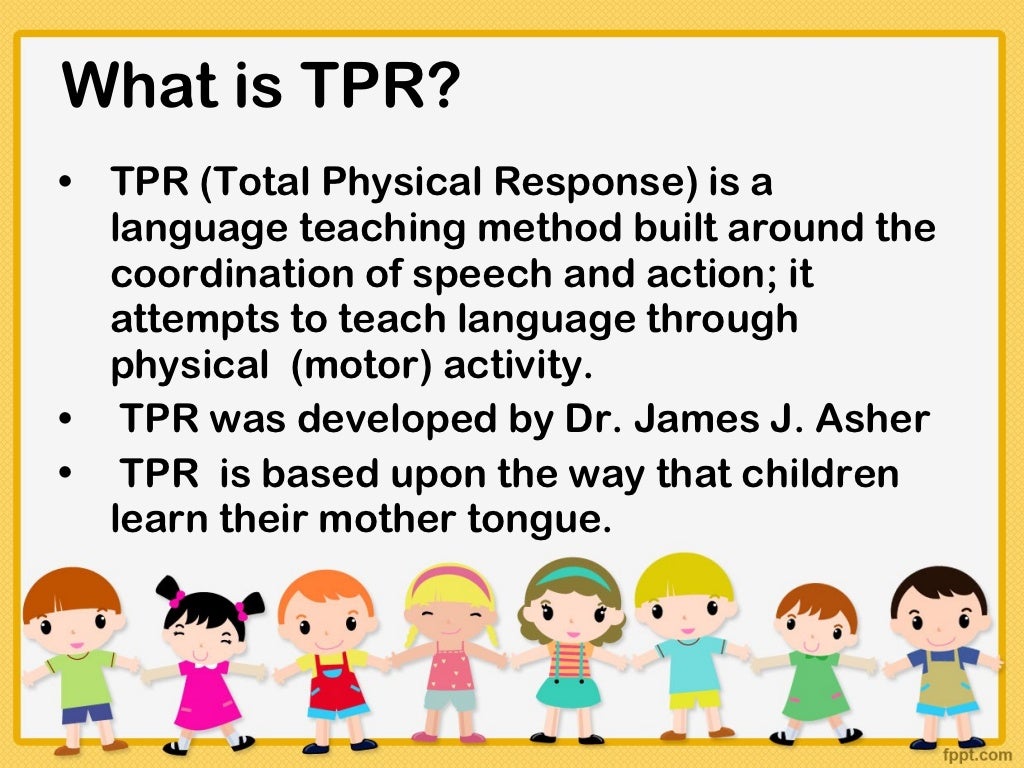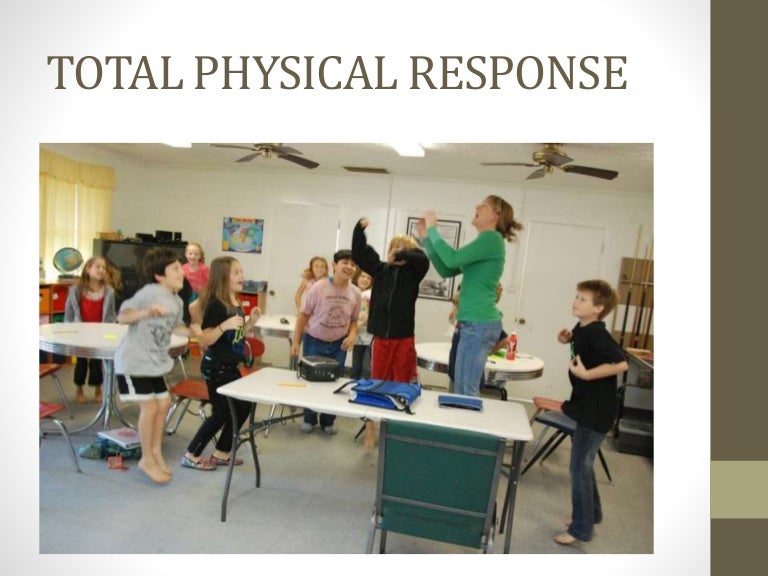
Total Physical Response Total physical response, Physics, Teaching english online
Total Physical Response is a method developed by James Asher in the 1960s. It was created with the goal of helping students learn a second language. TPR helps students learn by associating a physical action with new vocabulary. Some benefits of TPR: It helps students remember new phrases or words. It can be used in both large and small classes.

Total physical response by Andua Gutierrez Issuu
The principles of TPR, or Total Physical Response, are based on the way that children learn their first language. Actions before words When you learn your native language as a child, you don't just listen to the words. You watch your parents for clues to find out what their words mean.

TOTAL PHYSICAL RESPONSE
Total Physical Response is a teaching method that focuses on coordinating speech and physical action. Instead of only sitting through lectures, students also engage in learning activities where they have to move. Developed by Dr. James Asher, a professor and psychologist, TPR lets students develop their English skills in a fun and stress-free way.

Theories, Methods & Techniques of Teaching Total Physical Response in 2023 Total physical
Total Physical Response is a language-learning approach based on the relationship between language and its physical representation or execution. TPR emphasizes the use of physical activity for increasing meaningful learning opportunities and language retention. A TPR lesson involves a detailed series of consecutive actions accompanied by a.

ENGLISH LANGUAGE AND LITERATURE
Total Physical Response (TPR) is a language teaching method built around the coordination of speech and action; it attempts to teach language through physical (motor) activity. Developed by James Asher, a professor of psychology at San Jose State University, California, it draws on several traditions, including developmental psychology.

Total Physical Response Total physical response, Esl teaching resources, Online teaching
Total Physical Response (TPR) is an classic language teaching methodology that emphasizes language learning by having students respond physically to language cues. TPR is effective for reinforcing and practicing active language and vocabulary. Common games used in language classrooms such as Simon

Explain the Different Steps of Total Physical Response
Total Physical Response quiere decir literalmente, Respuesta Física Total. Nació con el objetivo de ser una herramienta para el aprendizaje de segundos y terceros idiomas. Consiste en que los alumnos reciben un input oral o visual y reaccionan a él, utilizando una respuesta corporal.

an info sheet with the words when to use tpr and how to use it
Respuesta Física Total. La Respuesta Física Total (RFT, en inglés Total Physical Response, TPR) es un método de enseñanza de lenguas que combina el habla con la acción y propone enseñar la lengua a través de la actividad física.Desarrollado por J. Asher, profesor de psicología de la Universidad Estatal de San José, California, el método se relaciona con la teoría de la memoria en.

Total physical response
About Press Copyright Contact us Creators Advertise Developers Terms Privacy Policy & Safety How YouTube works Test new features NFL Sunday Ticket Press Copyright.

TOTAL PHYSICAL RESPONSE YouTube
Total Physical Response is a strategy in which students make connections to words, phrases, and sentences by creating physical movements to define them. TPR is a way to physically interact with language and to solidify and demonstrate comprehension. The strategy can be used to learn new vocabulary words, to demonstrate comprehension of words.

TOTAL PHYSICAL RESPONSE
TPR stands for Total Physical Response and was created by Dr. James J Asher. It is based upon the way that children learn their mother tongue. Parents have 'language-body conversations' with their children, the parent instructs and the child physically responds to this. The parent says, "Look at mummy" or "Give me the ball" and the child does so.

Let's Educate! Pengajaran Bahasa Komunikatif Language Teaching) dan Total
Total Physical Response Imagine you're with a student who doesn't speak much English, and you ask them if they like reading. They stare at you blankly because they have no idea what you just asked. Content verified by subject matter experts Free Vaia App with over 20 million students

Respuesta Física Total (Total Physical Response) aprende inglés con el método TPR.
Total Physical Response (TPR) was systematized as a language teaching method by American psychologist James Asher in the 1970s. It is rooted in the belief that when action is combined with language, learning is boosted. TPR is a comprehension approach, stressing the importance of input in the initial phase and modelled on the stress-free way that children learn their mother tongue.

Total Physical Response
Used in part of a lesson, the teacher might do the following: Demonstrate and say the action out loud (sit down, stand up). Ask students to do it (please sit down/please stand up). Repeat the action again when you say it. Write it on the board. Point to the action on the board and ask students to do it.

Total Physical Response
La Respuesta Física Total (TPR, por sus siglas en inglés Total Physical Response) es un enfoque de enseñanza del idioma que se basa en la idea de que la mejor manera de aprender un idioma es a través del movimiento y la acción física.La TPR se originó en la década de 1960 por el profesor de lenguas James Asher, quien sugirió que la mejor manera de aprender un idioma es a través de la.

Total Physical Response Learning through Action! Seidlitz Education Total physical response
Total physical response is a language teaching method developed by James Asher, a professor emeritus of psychology at San José State University. It is based on the coordination of language and physical movement. In TPR, instructors give commands to students in the target language with body movements, and students respond with whole-body actions.